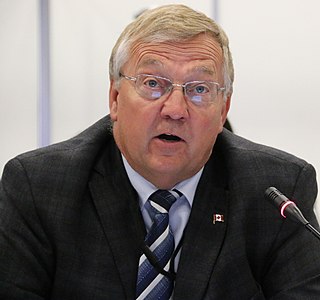
A quorum is the minimum number of members of a deliberative assembly necessary to conduct the business of that group. According to Robert's Rules of Order Newly Revised, the "requirement for a quorum is protection against totally unrepresentative action in the name of the body by an unduly small number of persons." In contrast, a plenum is a meeting of the full body. A body, or a meeting or vote of it, is quorate if a quorum is present.
Environment and Climate Change Canada, is the department of the Government of Canada responsible for coordinating environmental policies and programs, as well as preserving and enhancing the natural environment and renewable resources. It is also colloquially known by its former name, Environment Canada.

John Norman McKay is a Canadian lawyer and politician. He is the Liberal Member of Parliament for the riding of Scarborough—Guildwood. McKay was Parliamentary Secretary to the Minister of Finance from 2003 to 2006 during the government of Paul Martin, then served as an opposition MP and critic until November 2015 during the government of Stephen Harper. As of April, 2019, he serves as Chair of the Standing Committee on Public Safety and National Security; Chair of the Canadian Section of the Canada-United States Permanent Joint Board on Defence; Chair of the Canada-United Kingdom Inter-Parliamentary Association, Vice-chair of the Canada-United States Inter-Parliamentary Group, and Counsellor Canadian NATO Parliamentary Association.

Linda Francis Duncan is a Canadian lawyer and former politician who served as the member of Parliament (MP) for the riding of Edmonton—Strathcona from 2008 to 2015. A member of the New Democratic Party (NDP), Duncan was the only non-Conservative MP from Alberta from 2008 to 2015.

Edward D. "Ed" Fast is a Canadian politician who has served as the member of Parliament (MP) for Abbotsford since 2006. A member of the Conservative Party of Canada, he was Minister for International Trade and Minister for the Asia–Pacific Gateway from 2011 to 2015 under Prime Minister Stephen Harper.

Joyce Murray is a Canadian politician who has been the minister of fisheries, oceans and the Canadian Coast Guard since 2021. A member of the Liberal Party, she has represented the riding of Vancouver Quadra in the House of Commons since 2008. She was re-elected in the 41st, 42nd, 43rd, and 44th federal elections. Murray was appointed as President of the Treasury Board and Minister of Digital Government on March 18, 2019. She was re-appointed as Minister of Digital Government following the 2019 election. In 2021, she was appointed Minister of Fisheries, Oceans and the Canadian Coast Guard.

Randall C. Garrison is a Canadian politician. Elected to the House of Commons in the 2011 federal election, he represents the electoral district of Esquimalt—Saanich—Sooke and is a member of the New Democratic Party. He serves as the party's critic for lesbian, gay, bisexual, and transgender issues, succeeding former MP Bill Siksay, and for National Defence. Since becoming an MP, he has introduced legislation to amend the Canadian Human Rights Act and the Criminal Code, return federal environmental protection to the Goldstream River, and lobbied the government to implement an action plan concerning the endangered Southern resident killer whales. A former criminology and political science instructor at Camosun College, Garrison is openly gay and lives in Esquimalt, British Columbia, with his partner, Teddy Pardede.

Megan Anissa Leslie is a Canadian politician and environmental advocate. She is the president and CEO of World Wildlife Fund Canada (WWFC) and on the advisory board of the Leaders' Debates Commission.

Earl Dreeshen is a Canadian politician, serving as a Member of Parliament with the Conservative Party since 2008.

Alice Wong Chan Siu-ping is a Canadian politician and a member of the Conservative Party who served as the member of Parliament (MP) for the electoral district of Richmond Centre from 2015 to 2021. She previously served as the MP for the Richmond riding from 2008 to 2015. In 2011, she was appointed by Prime Minister Stephen Harper to be Minister of State for Seniors, becoming the first Chinese-Canadian woman to serve in the Cabinet of Canada. She served in that position until 2015.

Bruce Tolhurst Hyer is a Canadian politician, businessman, and ecologist. He is the former deputy leader of the Green Party of Canada and the former Member of Parliament for Thunder Bay—Superior North. Hyer was elected in the 2008 federal election, and re-elected with a wider margin in the 2011 federal election; on both occasions while standing for the New Democratic Party.

The 41st Canadian Parliament was in session from June 2, 2011 to August 2, 2015, with the membership of its House of Commons having been determined by the results of the 2011 federal election held on May 2, 2011. Parliament convened on June 2, 2011, with the election of Andrew Scheer as Speaker, followed the next day with the Speech from the Throne. There were two sessions in this Parliament. On August 2, 2015, Prime Minister Stephen Harper asked the Governor General to dissolve Parliament and issue the writ of election, leading to an 11-week election campaign period for the 2015 federal election. Significant legislation adopted during the 41st Parliament included the Copyright Modernization Act, the Safe Streets and Communities Act, the Jobs, Growth and Long-term Prosperity Act, the Jobs and Growth Act and the Fair Elections Act.

Corey James Tochor is a Canadian politician who has served as the Member of Parliament for Saskatoon—University since the 2019 federal election.

Idle No More is an ongoing protest movement, founded in December 2012 by four women: three First Nations women and one non-Native ally. It is a grassroots movement among the Indigenous peoples in Canada comprising the First Nations, Métis and Inuit peoples and their non-Indigenous supporters in Canada, and to a lesser extent, internationally. It has consisted of a number of political actions worldwide, inspired in part by the liquid diet hunger strike of Attawapiskat Chief Theresa Spence and further coordinated via social media. A reaction to alleged legislative abuses of Indigenous treaty rights by then Prime Minister Stephen Harper and the Conservative federal government, the movement takes particular issue with the omnibus bill Bill C-45. The popular movement has included round dances in public places and blockades of rail lines.

The Canadian Navigable Waters Act is one of the oldest regulatory statutes enacted by the Parliament of Canada. It requires approval for any works that may affect navigation on navigable waters in Canada.

The Jobs, Growth and Long-term Prosperity Act is an Act of the Parliament of Canada. This omnibus bill was introduced by Jim Flaherty, Minister of Finance under Prime Minister Steven Harper's majority Conservative government as a 2012 Budget Implementation Act. Bill C-38 was given Royal Assent on June 29, 2012. Bill C-38 and Bill C-45 attracted controversy both for their size and for the breadth of provisions contained that were not fiscally related. Elizabeth May, leader of the Green Party, claimed that, "[i]n spite of the fact that most Canadians have no idea how seriously Bill C-38 will affect their lives, the Senate is about to begin hearings so that Conservative Senators can vote on it as soon as possible... This railroading version of democracy is tragic for Canada."
Gord Johns is a Canadian businessman and politician. Since 2015, he has served as the New Democrat Member of Parliament for the federal electoral riding of Courtenay—Alberni in the House of Commons of Canada. He previously served as a town councillor for Tofino, British Columbia, and founded a number of small businesses.
Alistair Bruce MacGregor is a Canadian politician, who was elected to the House of Commons of Canada in the 2015 Canadian federal election to represent the electoral district of Cowichan—Malahat—Langford. He is a member of the New Democratic Party. During the 42nd Canadian Parliament, MacGregor sponsored three private member bills, though none reached second reading stage: Bill 252 to add Shawnigan Lake to the list of navigable waters regulated under the Navigation Protection Act, Bill C-279 to limit federal election campaigns to a maximum of 46 days, Bill C-430 to create an organic farming tax credit.
Richard J. "Dick" Cannings is a Canadian biologist, author and politician. He was elected as the South Okanagan—West Kootenay Member of Parliament in the 2015 Canadian federal election for the New Democratic Party, and re-elected in 2019. As a member of the 42nd Canadian Parliament he sponsored three private member's bills: one to promote the use of wood in federal public works projects, one to add various lakes and rivers to Navigable Waters Protection Act, and another to a Minister of Environment to respond to a Committee on the Status of Endangered Wildlife in Canada report. Cannings was appointed the NDP Critic for Post-Secondary Education as well as the Deputy Critic for Natural Resources in the 42nd Canadian Parliament. He became the NDP Critic for Natural Resources in 2016 and served in that position until 2021. In October 2021 he became the NDP Critic for Emergency Preparedness and Critic for Small Business and Tourism, as well as Deputy Critic for Natural Resources and Deputy Critic for Innovation, Science and Industry. In December 2021 he was named an inaugural member of the House of Commons Standing Committee on Science and Research.

An Act to amend the Canadian Human Rights Act and the Criminal Code is a law passed by the Parliament of Canada. It was introduced as Bill C-16 of the 42nd Parliament, 1st Session. The law adds gender expression and gender identity as protected grounds to the Canadian Human Rights Act, and also to the Criminal Code provisions dealing with hate propaganda, incitement to genocide, and aggravating factors in sentencing.














